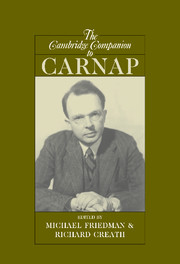Book contents
- Frontmatter
- Introduction: Carnap’s revolution in philosophy
- 1 Carnap’s intellectual development
- 2 Geometrical leitmotifs in Carnap’s early philosophy
- 3 Carnap and Frege
- 4 Carnap and Husserl
- 5 Carnap, Russell, and the external world
- 6 The Aufbau and the rejection of metaphysics
- 7 Carnap and the Vienna Circle: rational reconstructionism refined
- 8 Carnap and modern logic
- 9 Tolerance and logicism: logical syntax and the philosophy of mathematics
- 10 Carnap’s quest for analyticity: the Studies in Semantics
- 11 Carnap on the rational reconstruction of scientific theories
- 12 Carnap on probability and induction
- 13 Carnapian pragmatism
- 14 Quine’s challenge to Carnap
- Bibliography
- Index
8 - Carnap and modern logic
Published online by Cambridge University Press: 28 April 2008
- Frontmatter
- Introduction: Carnap’s revolution in philosophy
- 1 Carnap’s intellectual development
- 2 Geometrical leitmotifs in Carnap’s early philosophy
- 3 Carnap and Frege
- 4 Carnap and Husserl
- 5 Carnap, Russell, and the external world
- 6 The Aufbau and the rejection of metaphysics
- 7 Carnap and the Vienna Circle: rational reconstructionism refined
- 8 Carnap and modern logic
- 9 Tolerance and logicism: logical syntax and the philosophy of mathematics
- 10 Carnap’s quest for analyticity: the Studies in Semantics
- 11 Carnap on the rational reconstruction of scientific theories
- 12 Carnap on probability and induction
- 13 Carnapian pragmatism
- 14 Quine’s challenge to Carnap
- Bibliography
- Index
Summary
A distinguishing feature of analytic philosophy, or at least of one central strand in it, is the use of modern logic for the purpose of clarifying and solving philosophical problems. The most prominent figure in this tradition was Bertrand Russell; and second only to Russell was Rudolf Carnap. Directly and strongly influenced by Russell, Carnap passed on this influence to legions of later philosophers, including such widely influential figures as W. V. O. Quine. It is well known that Carnap was a main expositor and promoter of modern logic, as illustrated by his textbooks on the subject, from Abriss der Logistik (1929) to Einfuhrung in die symbolische Logik (1954). It is also well known that Carnap applied logic substantively, both in his own constructive endeavors in philosophy and in his criticism of metaphysics, as in Der logische Aufbau der Welt (1928a), “Uberwindung der Metaphysik durch logische Analyse der Sprache” (1932d), and Logische Syntax der Sprache (1934c).
Less well known is the fact that, in addition, Carnap was actively engaged in research on pure logic and related questions in early metamathematics. In particular, during large parts of the 1920s – parallel and subsequent to his work on the Aufbau – Carnap was pursuing a major research project in this area. A main goal of this project was to combine, and to reconcile, the approaches to logic and the foundations of mathematics he had encountered in interactions with Gottlob Frege and Bertrand Russell, on the one hand, and in the works of David Hilbert and his followers, on the other.
- Type
- Chapter
- Information
- The Cambridge Companion to Carnap , pp. 176 - 199Publisher: Cambridge University PressPrint publication year: 2007
- 9
- Cited by



